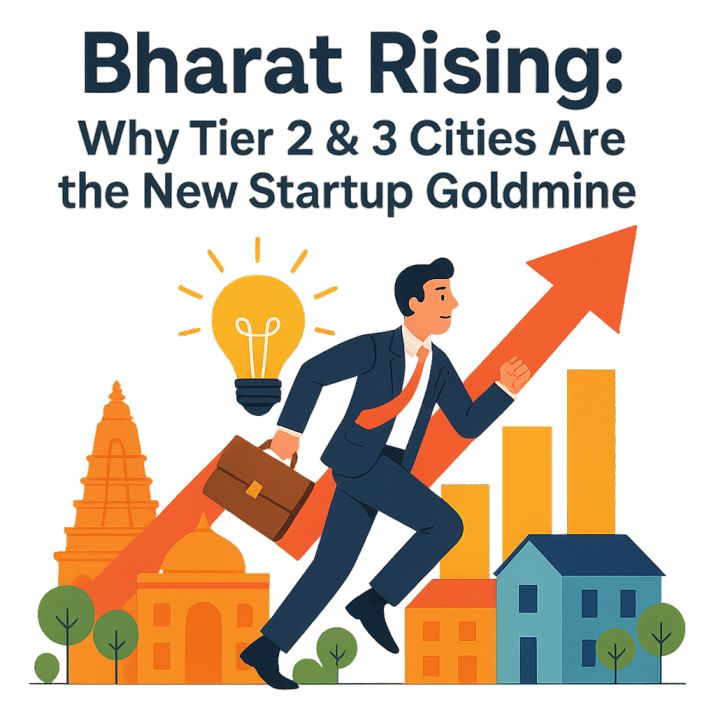Once upon a time, when someone said “startup,” your brain instantly conjured up images of glass buildings in Bengaluru, pitch decks flying across cafes in Gurgaon, or scooters zooming down the lanes of Hyderabad with food delivery tags. But hold that thought. The next unicorn? It might just emerge from a town where cows still leisurely cross roads and WiFi is shared across kirana shops.
Welcome to the era of Bharat Rising — where Tier 2 and Tier 3 cities are not just catching up; they’re leaping forward.
🚀 The Silent Boom You Didn’t See Coming
What’s brewing in cities like Indore, Surat, Bhubaneswar, Kanpur, and Coimbatore? A quiet but powerful startup revolution. With rising internet penetration, better infrastructure, and a young, tech-savvy population, these cities are now wearing the startup badge with pride.
Fact bomb: Over 45% of startups today are coming from beyond the metros. That’s not a trend — that’s a tidal wave.
🌱 Why Startups Are Sprouting Outside Big Cities
Let’s break it down:
1. Lower Costs, Higher Dreams
Office space in a metro = your startup’s left kidney.
Office space in Tier 2 = your weekend chai budget.
Lower real estate costs, affordable talent, and reduced operational expenses mean startups can do more with less. Burn rate becomes more manageable, giving founders a longer runway to build, test, and grow.
2. Raw, Untapped Markets
Startups that only cater to metro audiences are missing the bigger picture. Tier 2 and 3 cities are where real Bharat lives — aspirational, hungry, and underserved.
These cities are craving digital solutions: e-commerce, fintech, edtech, healthtech — you name it. And they’re willing to pay for services that solve their specific pain points.
3. Talent with Grit
Forget the stereotype. Talent in smaller cities is not only abundant — it’s fiercely hungry.
With improved access to online learning, coding bootcamps, and remote internships, local youth are skilled, agile, and loyal. Plus, without the distractions of big-city hustle culture, they focus better and stay longer.
4. Return of the Native
There’s a reverse brain drain happening. Many professionals and founders who once flocked to metros are now returning to their hometowns, bringing experience, networks, and ambition.
They’re building startups that understand the local pulse — and that’s half the battle won.
5. Digital India = Supercharged Bharat
High-speed internet, UPI, affordable smartphones — these aren’t just urban luxuries anymore. The digital backbone is now pan-Bharat, empowering even the remotest areas to shop, sell, learn, and invest online.
💡 Real Stories, Real Impact
Let’s take a detour into storytelling.
- Zoho — a globally respected SaaS company, operates out of Tenkasi, a small town in Tamil Nadu. Why? Peace, focus, and loyalty.
- Ninjacart — a fresh produce supply chain startup, built its rural outreach from non-metro hubs.
- Classplus — helping tuition teachers go digital, found massive traction in Tier 2/3 cities.
These aren’t exceptions — they’re becoming the rule.
💰 VCs Are Watching — And Investing
Guess what’s got venture capitalists curious lately? Not your next fancy AI pitch from an air-conditioned boardroom in Gurgaon — but a solid, ground-level idea from Patna that solves an actual logistics nightmare.
Investment is now following innovation, not location.
Funds are actively scouting for the next big thing from Bharat. Incubators, accelerators, and startup hubs are mushrooming in non-metros — and they’re well-funded, well-connected, and super hungry to grow.
👀 Challenges? Of Course. But Nothing You Can’t Solve
Let’s not sugarcoat it. Starting up in Tier 2/3 cities comes with its share of hiccups:
- Lack of ecosystem maturity
- Limited access to mentors and investors
- Smaller support networks
But hey — that’s where the first-mover advantage kicks in. Founders willing to build from scratch are laying the foundation for future ecosystems. And honestly, with remote tools, cloud tech, and online communities, geography is more flexible than ever.
🎯 The Startup Playbook for Small-City Founders
Here’s how to win in this new goldmine:
- Go hyperlocal: Solve real, specific problems for your region before scaling.
- Build frugally: Embrace jugaad. Make every rupee count.
- Leverage local influencers: Forget Bollywood stars. Local content creators drive trust.
- Partner with regional banks, schools, shops: Collaborate with ground-level institutions.
- Use language as a weapon: Products in local languages see higher engagement.
🌎 The Future Is Not Urban — It’s Distributed
The pandemic proved one thing — you don’t need a swanky office in a skyscraper to build a world-changing product. Talent is everywhere. Ideas are everywhere. And now, opportunity is everywhere too.
The startup wave is becoming inclusive, diverse, and geographically democratic. In the next 5 years, don’t be surprised if your favorite new app wasn’t born in a metro, but in a modest one-room office in Rajkot or Ranchi.
📢 Final Word: The Rise Is Real
Bharat is not catching up — it’s leaping forward.
The next frontier of innovation is not glassy towers but small town lanes. The next unicorns will wear lungis and kurtas, speak Hindi, Telugu, or Marathi, and solve problems their communities face daily.
So whether you’re a founder, investor, or dreamer — it’s time to look beyond the obvious. The gold rush has shifted.
Welcome to the new startup goldmine.
Welcome to Bharat Rising.

